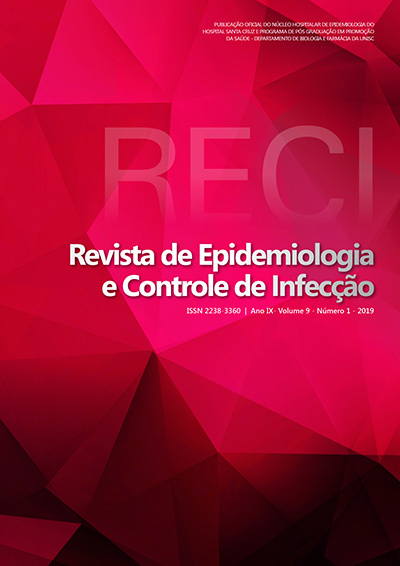Helicobacter pylori infection and associated factors
DOI:
https://doi.org/10.17058/reci.v9i1.11909Resumen
Background and Objectives: Helicobacter pylori is linked to gastroduodenal pathologies. To determine the frequency and potential risk factors of the H. pylori infection. Material and methods: A cross-sectional study was conducted, including 227 patients, submitted to upper gastrointestinal endoscopy. A questionnaire was applied to the patients, before endoscopy. The biopsy specimens were obtained from the antrum and gastric body for histology and PCR. The chi-square test was used for the categorical data analysis. P-values<0.05 were considered statistically significant.Results: 66.5% patients were positive for H. pylori. Based on the questionnaires applied to the patients, it was verified that marital status, smoking, alcohol consumption, toilet, education level and monthly family income had no significant association with the presence of H. pylori (p>0.05). However, we observed a significant association between the number of persons per household and presence of H. pylori (p=0.04). A statistically significant relation also was found between H. pylori and the patient’s age (p=0.04) and between the histological and endoscopic diagnoses and the H. pylori infection (p≤0.01). Conclusions: We found a significant relation between household crowding and presence of H. pylori, which seems facilitate the person-to-person transmission H. pylori within families. Our results also suggest a cohort phenomenon. The increase in the frequency of H. pylori infection according to age may be due the acquisition of bacterium predominantly in childhood, when the sanitary conditions were deficient, and not during adulthood. Once acquired and untreated, the persistent H. pylori infection might have led to the development of severe gastroduodenal diseases.Descargas
##submission.downloads##
Publicado
Cómo citar
Número
Sección
Licencia
The author must state that the paper is original (has not been published previously), not infringing any copyright or other ownership right involving third parties. Once the paper is submitted, the Journal reserves the right to make normative changes, such as spelling and grammar, in order to maintain the language standard, but respecting the author’s style. The published papers become ownership of RECI, considering that all the opinions expressed by the authors are their responsibility. Because we are an open access journal, we allow free use of articles in educational and scientific applications provided the source is cited under the Creative Commons CC-BY license.


